Asia-Pacific Economic Cooperation (APEC)
The 23rd APEC Economic Leaders’ Meeting in the Philippines
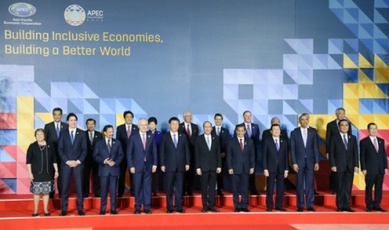 (Photo: Cabinet Public Relations Office)
(Photo: Cabinet Public Relations Office)
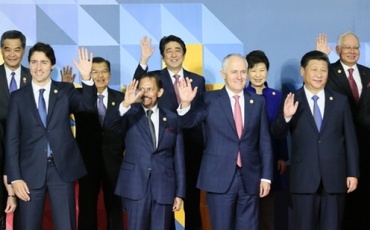 (Photo: Cabinet Public Relations Office)
(Photo: Cabinet Public Relations Office)
The 23rd Asia-Pacific Economic Cooperation (APEC) Economic Leaders' Meeting was held in Manila, the Republic of the Philippines on November 18 and 19, and Mr. Shinzo Abe, Prime Minister of Japan attended the meeting. With H.E. Mr. Benigno S. Aquino III, President of the Philippines, and under the theme of "Building Inclusive Economies, Building a Better World," broad-ranging discussions took place focusing on "Enhancing the Regional Economic Integration ," "Fostering SMEs Participation in Regional & Global Markets " "Investing in Human Capital Development," and "Building Sustainable and Resilient Communities."
As outcomes of the meeting, the "APEC Economic Leaders' Declaration – Building Inclusive Economies, Building a Better World: A Vision for an Asia-Pacific Community,(PDF) " , and as its annexes, "APEC Strategy for Strengthening Quality Growth (PDF)
" , and as its annexes, "APEC Strategy for Strengthening Quality Growth (PDF) " and "APEC Services Cooperation Framework (PDF)
" and "APEC Services Cooperation Framework (PDF) " were released . In addition, "Statement on Supporting the Multilateral Trading System and the 10th WTO Ministerial Conference (PDF)
" were released . In addition, "Statement on Supporting the Multilateral Trading System and the 10th WTO Ministerial Conference (PDF) " (MC10) was released as well.
" (MC10) was released as well.
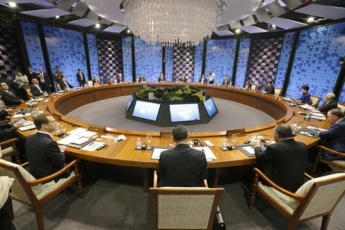 (Pool Photo)
(Pool Photo)
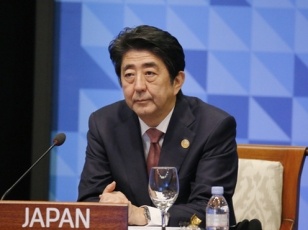 (Pool Photo)
(Pool Photo)
Schedule of the Leaders’ Meeting
| November 18 | Afternoon | APEC Business Advisory Council (ABAC) Dialogue with APEC Leaders Informal Dialogue with the Pacific Alliance |
| November 19 | Morning | Session on the Regional and Global Economy Retreat 1 : "Inclusive Growth through Regional Economic Integration" |
| Afternoon | Retreat 2 : "Inclusive Growth through Sustainable and Resilient Communities" |
1 Outline of the Leaders' Meeting
(1) Retreat 1: "Inclusive Growth through Regional Economic Integration"
(a) Discussions took place on APEC Growth Strategy, supporting the multilateral trading system, the Free Trade Area of the Asia-Pacific (FTAAP), connectivity, global value chain cooperation, participation in regional and global markets by MSMEs, and cooperation in the services field.
(b) Leaders of the economies expressed their views including:
- Condemning the terrorist attacks that occurred in Paris, and stressed that the international community needs to work closely together to engage in counterterrorism
- Welcoming the agreement in principle on the Trans-Pacific Partnership (TPP) and noted that this agreement contributed to the tangible step forward towards the realization of the Free Trade Area of the Asia-Pacific (FTAAP).
- Active discussions towards MC10 should continue.
- There is a need to steadily implement the "APEC Connectivity Blueprint for 2015-2025" and the "APEC Strategic Blueprint for Promoting Global Value Chain (GVC) Development and Cooperation," which were endorsed last year at the APEC Economic Leaders' Meeting
- Supporting and welcoming the initiatives relating to micro, small and medium enterprises (MSMEs) and services led by the hosting economy, the Philippines
(c) The overview of the points made by Prime Minister Abe is as follows:
- ( i ) In order to achieve the 2020 Bogor target, it will be necessary to ensure "quality growth," along with engaging in regional economic integration. From this perspective, Japan welcomes the new strategic framework of APEC Growth Strategy.
- ( ii ) Abenomics has entered its second stage. The Government of Japan is determined to increase jobs and incomes through the implementation of the revised growth strategy, and is presenting a target of realizing "The Society with the Dynamic Engagement of All Citizens." Specifically, the Government intends to achieve growth by diverting the "fruits" of Abenomics to policies that encourage women, the young, and people with disabilities to become more actively engaged. As a result of these efforts, Japan will achieve a strong economy and contribute to the inclusive growth of the region.
- (iii) "Strengthening the rule of law in the economic field " is an important and key phrase in terms of high quality growth and prosperity.
- (iv) The multilateral trading system forms the foundation of the global economy, and the recent increase in protectionism is concerning. In particular, excess production capacity is generating export drives that are incuring protectionism. Leaders should continue to show strong resolve to resist protectionism, and aim for concrete outcomes at the MC10 at the end of the year. Following the MC10, leaders should explore approaches to the World Trade Organization (WTO) negotiations in order to handle unresolved challenges and the challenges of the times. In plurilateral negotiations such as the Information Technology Agreement (ITA) expansion negotiations and the Environmental Goods Agreement (EGA) negotiations also, discernible outcomes should be produced at the MC10.
- ( v ) The new economic order that will be created as a result of the TPP, on which an agreement in principle has been reached, will serve as a basis for creating rules in the FTAAP. Japan also intends to accelerate the Regional Comprehensive Economic Partnership (RCEP) negotiations.
- ( vi ) Regional economic integration will also be an opportunity for MSMEs to embark on participating in the global market. Japan is engaging in improving the investment climate and enhancing resilience to natural disasters etc., and will contribute to strengthening SME financing.
- (vii) Japan is leading the follow up to the "APEC Connectivity Blueprint for 2015-2025" that was endorsed last year, including through efforts to enhance maritime connectivity. In May this year, Japan announced the "Partnership for Quality Infrastructure." The content includes greater utilization of Japanese ODA loans to Asia in the infrastructure field, promoting initiatives for a collaborative framework with the Asian Development Bank (ADB), and proactively providing funding for projects with relatively high risk profiles.
- (viii) Japan supports the cooperative framework for services being led by the Philippines. In order to Attracting sophisticated manufacturing industries by manufacturing-related services such as research and development, design, marketing, maintenance and repairs, has to be accompanied and Japan has compiled an action plan to that end. Japan will seek to expand regional trade and investment as a tool for implementing the plan.
(2) Retreat 2: "Inclusive Growth through Sustainable and Resilient Communities"
(a) Discussions took place on human capital development, women's empowerment, rural development, food security, urbanization, energy resilience, and emergency preparedness.
(b)The Leaders of the economies expressed their views including:
- In order to pursue economic growth, human capital development is important, and support from developed economies in areas such as skill training is necessary
- Given that population decline is anticipated, it would be important to secure skilled human capitals and seek to eliminate mismatches in the labor supply-and-demand balance
- Women's empowerment is important for further economic growth, and various empowerment policies will be implemented, such as initiatives for enhancing girls' education and the ratio of women occupying social positions
- Welcomed the APEC Disaster Risk Reduction Framework being led by the hosting economy, the Philippines
- The "Sendai Framework for Disaster Risk Reduction 2015-2030" that was compiled at the United Nations (UN) World Conference on Disaster Risk Reduction is important, and they hoped to learn from Japan's know-how in disaster management
- Economic measures are a strong aspect of the Conference of the Parties (COP), not simply the climate change issues and disaster issues, and an agreement on ambitious long-term targets should be reached at COP21
(c) The overview of the points made by Prime Minister Abe is as follows:
- (i) "The Society with the Dynamic Engagement of All Citizens" is an important and key phrase of the second stage of Abenomics, and the Government of Japan is currently engaged in compiling a policy package aimed at realizing that.
- (ii) women's empowerment is linked to the further economic development of the region. Japan is contributing to realizing ‘A Society in which Women Shine' through preparing legislation for encouraging the employment and promotion of women, holding the World Assembly for Women (WAW!), and APEC initiatives that aim to increase the ratio of women in management positions.
- (iii) Nearly five years have passed since the Great East Japan Earthquake, but recovering from the disaster remains an important challenge. Japan welcomes the formulation of APEC's first comprehensive disaster reduction framework. Japan will pursue efforts in line with the "Sendai Framework for Disaster Risk Reduction 2015-2030" that was compiled at the UN World Conference on Disaster Risk Reduction. It is also proposing the establishment of a World Tsunami Day to the UN.
- (iv) Efforts for enhancing resilient value chain resilience to natural disasters etc., and the "Initiative for Enhancing the Quality of Electric Power Infrastructure" are in the process of being implemented.
- (v) Terrorism is a major threat to safe economic activity, including value chains. Japan is striving to strengthen comprehensive counterterrorism, including against illegal funding activities and for border controls, and welcomes APEC's counterterrorism-related efforts, including the utilization of the Passenger Name Record (PNR).
2 ABAC Dialogue with APEC Leaders
 (Photo: Cabinet Public Relations Office)
(Photo: Cabinet Public Relations Office)
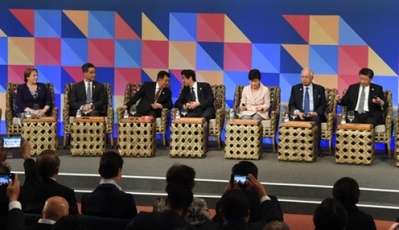 (Photo: Cabinet Public Relations Office)
(Photo: Cabinet Public Relations Office)
3 Informal Dialogue with the Pacific Alliance
4 Achievement of the Meeting
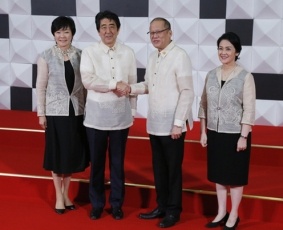 (Pool Photo)
(Pool Photo)
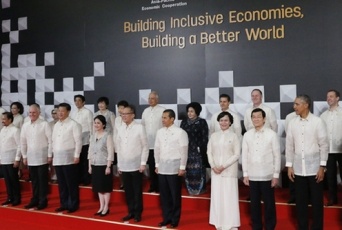 (Pool Photo)
(Pool Photo)
- (1) In regard to the multilateral trading system, which is the foundation of free trade, by releasing the message as a standalone of the Leaders' Declaration, Leaders could confirm the contributions that the WTO has been making to the multilateral trading system thus far, and issue a political message for a successful MC10.
- (2) In regard to the FTAAP, while mentioning to the agreement in principle on the TPP, it was reconfirmed that the FTAAP should be pursued as a comprehensive, high quality free trade agreement by building on ongoing regional undertakings
- (3) The leaders agreed on a new strategy framework that strengthens the "APEC Growth Strategy" formulated in Yokohama in 2010 and focuses on "quality growth." The leaders were also able to advance discussions on services and trade liberalization, including agreeing on a cooperative framework in the services field.
- (4) Reaffirmed and highlighted the importance of quality infrastructure investment at the leaders' level.
- (5) In response to the recent terrorist attacks in Paris, it was possible to issue a message condemning all acts of terrorism.
- (6) Japan made a significant contribution to this year's discussion on "Inclusive Growth" as a result of showcasing to APEC leaders and business leaders from the APEC region the initiatives that Japan emphasizes in pursuing economic growth and quality growth, such as "the Society with the Dynamic Engagement of All Citizens," efforts being made under the second stage of Abenomics, the promotion of the advancement of women, the "Partnership for Quality Infrastructure," and disaster reduction.

